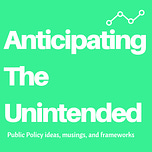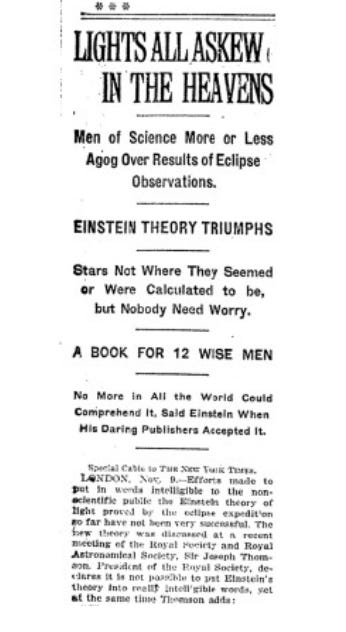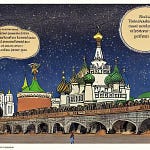While excellent newsletters on specific themes within public policy already exist, this thought letter is about frameworks, mental models, and key ideas that will hopefully help you think about any public policy problem in imaginative ways.
Audio narration by Ad-Auris.
India Policy Watch: The Demarcation Between Science And Ramdev
Insights on burning policy issues in India
- RSJ
Event 1: May 23, 2021. Yoga guru Ramdev:
"Everyone should progress through self-evaluation. Some allopathic doctors too consider Indian medical science, Ayurveda, yoga as pseudo-science, (emphasis ours) which hurts crores of people.”
Event 2: May 29, 1919. New York Times (reporting on the event on Nov 7, 1919):
I will connect the two events (hopefully) in a bit.
Take Event 1. This was Ramdev in his response to the letter he received from Dr Harsh Vardhan, the Union Minister for Health. The minister had written to Ramdev about his recent statements about allopathy and doctors. You can read more about it here.
Dr. Vardhan was forced to write to Ramdev because of the campaign by the IMA (Indian Medical Association) against the damaging statements made Ramdev about modern medicine. Over the past year, Patanjali Ayurved, a company promoted by Ramdev, has made several claims of curing Covid-19 in seven days through its product, Coronil. He has also, at different times, called Allopathy a ‘stupid science’, falsely claimed over 10,000 allopathic doctors died after taking both doses of vaccines and blamed the global drug ‘mafia’ for conspiring against him, Ayurveda and India in that order.
Now you might dismiss the whole thing as a sideshow of which there are plenty at anytime in India. But this isn’t one. Ramdev is a hugely influential figure who has a daily show on the national TV channel watched by millions. He singlehandedly created a packaged goods behemoth in the last five years riding on a deeply held belief among Indians about the ‘purity’ of Ayurveda. There have been many questions on those claims. But that’s another story.
Anyway, there are a few real issues to contend with here. First, we are in the middle of a pandemic and our fastest way out of it is to vaccinate people at lightening speed. Any statement or action that stops us from doing this is bad and must be stopped. Second, India has made real progress on key health parameters like infant and maternal mortality rates, malnutrition, life expectancy and disease burden in the past two decades. But the harsh reality is it is still placed in the bottom quartile among nations on these metrics. We have had some hard fought wins in making modern medical treatments acceptable among people. We shouldn’t be frittering away these gains by raising suspicions about it among the masses. Lastly, the frontline workers and doctors have put their lives on line during the pandemic to serve the patients. We were showering flower petals on them a year back. Since everything is political now in India and nationalism can be used to defend the indefensible, the troll armies have turned this episode into a dystopian farce where pharma ‘mafia’ and Christian lobbies are the villains and Ramdev is the one exposing their nefarious plans. Now any doctor speaking against Ramdev risks being labelled a pawn hurting India’s interests and its inevitable rise that these lobbies are hard at work to stop. That we want to alienate doctors, hospitals and pharma companies in middle of a pandemic is beyond my comprehension. This is a self goal like no other.
The Demarcation Problem
Anyway, the point about pseudoscience made by Ramdev is of interest to me. Who defines it? If crores of people follow something, does that mean it shouldn’t be called pseudoscience? Palmistry, astrology, homoeopathy, Ayurveda - where do they stand on the spectrum of science and pseudoscience? Since some kind of revivalism is on within the Indian society, it will be useful to explore this further.
That brings me to Event 2. Why was the eclipse on May 29, 1919 such an event? Here’s why:
A hundred years ago, Albert Einstein wasn’t a household name. He was a professor in Berlin, known to scientists, intellectuals, his divorced wife and the first cousin who would soon become his second wife — but not to the world.
His rise to superstardom began on May 29, 1919, when the moon and sun lined up just right for a solar eclipse. Photos of the astronomical event showed something strange: A few of the stars visible during the blackout were in the wrong place.
Einstein had foreseen this. Using his theory of general relativity, he made the seemingly crazy bet that the stars’ positions in the sky would shift during an eclipse, and even calculated by how much.
As the data came in and the results were confirmed, the general theory of relativity was proven. Newtonian physics was no longer the truth.
“Revolution in Science,” the front page of The Times of London proclaimed. “New Theory of the Universe: Newtonian Ideas Overthrown.” The New York Times followed suit with “Men of Science More or Less Agog.”
Following this with interest was a precocious 17 year old student in the University of Vienna.
His name. Karl Popper.
This event would leave a deep impact on him as he thought about the nature of truth and the philosophy of science in his later life. The idea that Einstein could precisely postulate in advance what would happen during a solar eclipse and then have the courage for it to be proven or be ‘falsified’ publicly was in sharp contrast to other ‘sciences’ that were in fashion during those years in Europe, namely, Marxism and Psychoanalysis.
For over two centuries, scientists had empirically tested Newtonian laws and it worked in all known cases. New inventions came up based on these laws including the steam engine and the power loom that revolutionised societies. Kepler showed how the laws worked for planets and other celestial objects. Haley predicted a comet would reappear again in 76 years based on it. The scientific method that Bacon had proposed involving observation, hypothesis, test and conclusion was proven over and over again for Newtonian physics. That’s how the universe worked. Yet, when Einstein argued that they didn’t work for the special case of really large objects and it was proven during the eclipse of 1919, the entire community of physicists updated their priors.
For Popper this was the ‘demarcation’ between what he called science and non-science (later termed pseudoscience by others ). To him all observation is selective and can be used to prove anything. Psychoanalysis was a prime example. Therefore, he dismissed inductive reasoning as the method of drawing scientific inference. Because every single observation so far has followed Newtonian law, doesn’t mean it is the truth. Because the Sun rises every morning doesn’t necessarily prove it will rise tomorrow. More has to be done.
Popper instead offered ‘falsifiability’ as the test to ‘demarcate’ science and non-science. As he put it, you can always cherry-pick evidence to prove any theory. Like psychoanalysts and Marxists of his time were doing or what Ramdev is doing with his claims. That’s not enough. For him what really counted as science was if you could stake your theory on a future prediction that could turn out to be false like Einstein and the physicists did with the solar eclipse. A million instances of something working isn’t enough to prove something is science but a single counter-instance is enough to falsify the claim that it is science. That’s how the claim should be tested. On falsifiability. So, science is always about a provisional truth till someone falsifies it. The moment it is falsified, it is no longer science. Science, to Popper, therefore was a grand pursuit to solve big problems and not about making series of tiny empirical observations and figuring out the cause behind them. The observations were only to be made to serve the grand pursuit of truth.
Applying Falsification
Now there were others who debated with Popper on the philosophy of science, most notably, Kuhn who coined the term ‘paradigm shift’ to explain how science evolves and those debates are best left for another day. For now, let’s consider ‘falsifiability’ as explained by Popper and view modern medicine as it is practised today. The entire drug discovery and development process involving identification of likely compounds useful in curing a disease, synthesis, characterisation, validation, optimisation and assays that will make it ready for clinical trials follows the principle of finding a single counter instance that would falsify the results. The clinical trials, multiple reviews by the regulators and then the monitoring of the drug performance after it has been launched in the market are all meant to ensure that any instance of failure is captured and studied to eliminate the root cause. This is a rigorous process to stand the test of ‘falsifiability’ and keep modern medicine as close to true science as possible.
I will leave it to you to assess other ‘sciences’ I have mentioned earlier on this scale. For me none pass the muster.
To be clear, this isn’t to overstate the primacy of science in our lives. You might find comfort and peace of mind through astrology. Yoga and Ayurveda might help you to stay fit and build your immunity. You might have personal experience of homoeopathy working for you. Some scientist who retired from ISRO (or IISc) or some former Nobel prize winner might believe in past life regression or Vedic chants to cure something. These could all be observable truth for those instances. It won’t make them science. Because they can easily be falsified.
And since we are at it, let’s not fall to the usual exaggerated claims that do the rounds on Whatsapp. Yes, China is big on their traditional medicines. But if you dig deeper, most of the traditional medicines sold are for the usual reasons: to make you “strong” (wink), for skin ailments and for common colds and fever. Nobody is claiming it will cure Covid-19. The other argument about modern medicine deriving their compounds from nature like Ayurveda also needs to be understood better. It is true many modern drugs have compounds that are extracted from plants and herbs that we often use in Ayurveda. But the modern medicine process is quite exact about the compound, the amount and how it should be delivered into our system. Eating the same plant or herb as a paste or in food isn’t the same thing though it might occasionally yield the same results.
There is a difference.
The same as that between Sanjeevani and the Dronagiri mountain. Between specifics and generalisation.
And no, searching for Sanjeevani isn’t exactly a scientific pursuit.
One of the duties of citizens mentioned as part of the Directive Principles of State Policy in our Constitution is “to develop the scientific temper, humanism and the spirit of inquiry and reform”. This is good goal for every Indian to pursue.
You don’t need to jettison any tradition for it. The two can co-exist.
Global Policy Watch #1: When Conspiracy Theory Comes True
Bringing an Indian perspective to burning global issues
- RSJ
There was this amazing piece in the Newsweek about how a global ragtag band of gumshoes, data scientists, molecular biologists and conspiracy enthusiasts exposed the many false claims of the Wuhan Institute of Virology about the origins of Covid-19. The mountain of evidence collected and meticulously analysed by the group, who now go by the appropriate sounding name DRASTIC (Decentralized Radical Autonomous Search Team Investigating COVID-19), has been enough for the Biden administration to launch an investigation into the source of the virus. The lab origin of the virus was a theory that few believed in even a month ago. But now it is almost mainstream.
Conspiracy theories are often used as a label to delegitimise notions and those believing in it are seen as misfits. Calling something a conspiracy theory is to lower its credibility. They have been the bane of many elections, triggered unrest and have kept social media platforms on their toes. But the very public victory of DRASTIC will have an impact on this discourse. It won’t be easy to wave something off as a conspiracy theory. Pranay writes more about this in the next section below.
Interestingly (and fittingly, perhaps for this edition), the first philosopher to write about conspiracy theory was Karl Popper. In his book The Open Society and Its Enemies, Popper moves away from science in the realm of nature to the state and the society. He describes ‘conspiracy theory of society’ as an approach to explain a social phenomenon by finding out those who have planned or conspired for it. But Popper argues most conspiracies that are hatched don’t go as per plan and end up with unintended consequences. The role of social sciences, therefore, is to explain these unintended consequences arising out intentional human actions. That sounds like what we strive to do in this newsletter.
There will be lot more written as the origin of the virus story progresses. This might be the most consequential conspiracy theory of all time.
Global Policy Watch #2: Networks vs Hierarchies
Bringing an Indian perspective to burning global issues
— Pranay Kotasthane
This week had its fair share of mind-boggling stuff. To name a few: a court case by a Bollywood celebrity against 5G deployment, a well-known lawyer promoting vaccine hesitancy, and reports documenting how a group of passionate folk forced renowned scientists to eat their words on the virus lab-leak theory.
There’s something common to all these events. To borrow a phrase from media analyst Martin Gurri, such instances illustrate ‘the crisis of authority’ in the Information Age. There’s no theory that won’t be questioned by radically connected individuals, irrespective of the evidence backing it.
This newsletter has discussed Radically Networked Societies (RNS) many times over in disparate contexts. We have discussed how no issue is local anymore. Even highly-specialised issues are vigorously contested by laymen. Even decisions by authoritative organisations are questioned, debated, and sometimes overturned, in a vastly expanded information sphere.
The thesis of Martin Gurri’s 2014 book The Revolt of the Public is along similar lines. He frames the current upheaval as an asymmetrical warfare between hierarchical institutions of the Industrial Age and hyper-networked individuals of the Information Age. In his words:
“When judging his government, Homo informaticus can then do so in light of alternative possibilities—different views of the same policy or event, different values invoked for an action or inaction, different performance by other governments, real or imagined. The first step toward skepticism is doubt, and Homo informaticus, exposed to an independent channel, must confront choices and doubts when constructing his story of the world.
…
Governments of every stripe have had trouble grasping the sudden reversal in the information balance of power. Proud in hierarchy and accreditation, but deprived of feedback channels, the regime is literally blind to much global content. It behaves as if nothing has changed except for attempts by alien ideals—pornography, irreligion, Americanization—to seduce the public. Most significantly, the regime in its blindness fails to adjust its story of legitimacy to make it plausible in a crowded, fiercely competitive environment.
…
The consequences are predictable and irreversible. The regime accumulates pain points: police brutality, economic mismanagement, foreign policy failures, botched responses to disasters. These problems can no longer be concealed or explained away. Instead, they are seized on by the newly-empowered public, and placed front-and-center in open discussions. In essence, government failure now sets the agenda. As the regime’s story of legitimacy becomes less and less persuasive, Homo informaticus adjusts his story of the world in opposition to that of the regime. He joins the ranks of similarly disaffected members of the public, who are hostile to the status quo, eager to pick fights with authority, and seek the means to broadcast their opinions and turn the tables on their rulers. The means of communication are of course provided by the information sphere.”
Gurri, Martin. The Revolt of The Public and the Crisis of Authority in the New Millennium (pp. 89-90). Stripe Press. Kindle Edition.
There’s another way to model this crisis of authority. In edition #11, I had discussed the Overton Window. This framework suggests that for any political issue, there's a range of socially acceptable positions that's narrower than the range of all possible positions. These socially acceptable ideas are seen as being inside the Overton Window — they are mainstream and uncontroversial. On the other hand, policy positions outside it are viewed as shocking, upsetting, and electorally harmful. The key insight of this framework is that, with social pressure, the Overton Window can shift over time; today's radicals may become tomorrow's moderates. In the Information Age, something even more striking has happened. The Overton Window on practically every issue has been stretched such that nearly all possible positions on an issue have become socially acceptable. With that happening, the older institutions, which earlier exuded authority, are shredding legitimacy with every decision they make.
This is a value-agnostic assessment of the networked public. In the case of Wuhan lab-leak theory, the effect is a positive one as it has at least thrown light on the geopolitical power play that has suppressed this line of inquiry. The curious case of growing QAnon popularity in the US is the other side of the same coin.
But if I were forced to make a ‘bane or boon’ type call on our networked existence in the political sphere, it would be as follows. The backlash of the public is a boon in that it pushes governments towards more accountability. It puts the fear in a government that any wrongdoing will be found out, exposed, and mocked. The bane is that with the multiplication of identity-inspired comradeships across the spectrum, forming coalitions of any kind has become difficult. Every sect is splintering and trust between the splinters is a casualty. The cacophony of conflict spreads to every issue, regardless of how important and urgent it is. Governments become more opaque, more indecisive, and less persuasive in turn.
One thing is for sure: our industrial-era political setup is undergoing a fundamental transformation in the Information Age.
HomeWork
Reading and listening recommendations on public policy matters
[Audio] Sean Carroll’s Mindscape podcast: Liam Kofi Bright on Knowledge, Truth, and Science. Liam Kofi Bright received his Ph.D. in Logic, Computation and Methodology from Carnegie Mellon University. He is currently on the faculty of the London School of Economics in the Department of Philosophy, Logic, and the Scientific Method. He is well-known on Twitter as the Last Positivist.
[Blog] Check out Martin Gurri’s blog The Fifth Wave. Lots to read here.












Share this post